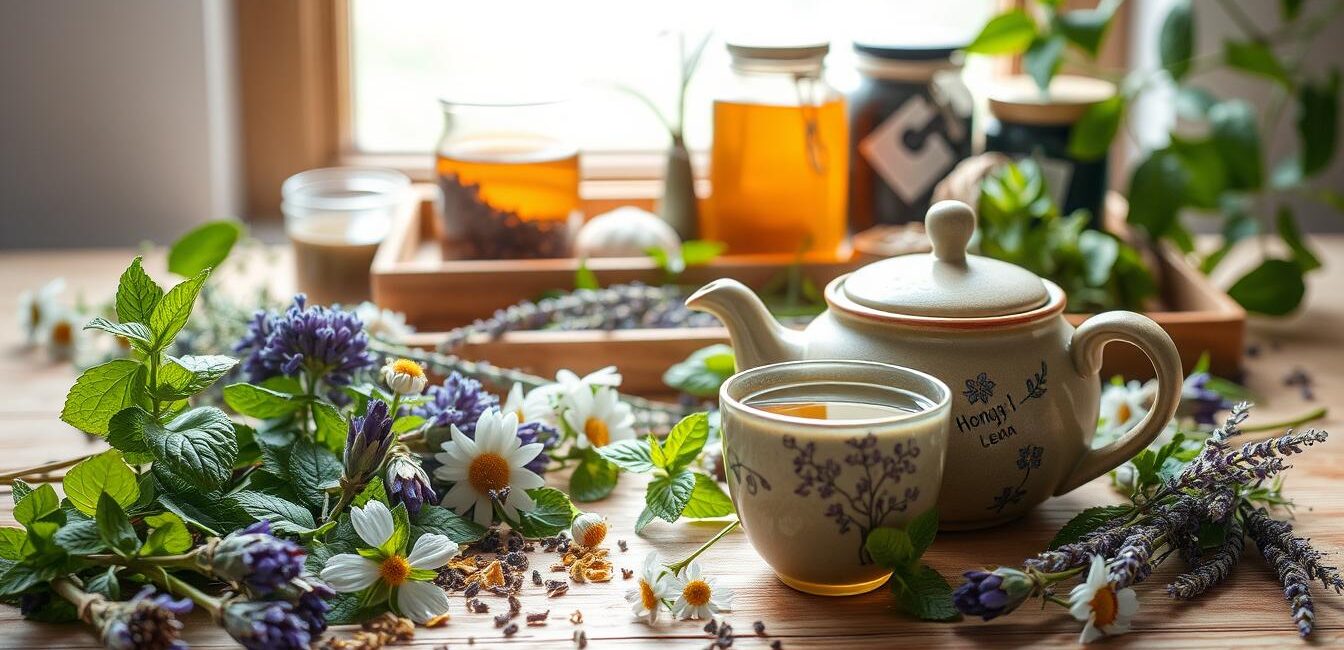If you’re into yoga and care about your health, you might be looking for ways to improve your practice. One great way is to drink organic herbal teas every day. Brands like Yogi Tea offer wellness teas that follow Ayurvedic principles and are certified quality.

These teas are good for your health and help with yoga by making you relax, find balance, and feel refreshed. By picking organic, you avoid bad additives and get the best ingredients. Let’s dive into how yoga and herbal teas go hand in hand, and how they can make your yoga better.
The Ancient Connection Between Yoga and Herbal Teas
The bond between yoga and herbal teas is deep and old. It comes from Ayurvedic medicine and spiritual practices. This connection has helped people find balance in body and spirit.

Historical Roots in Ayurvedic Traditions
Ayurvedic traditions have always used herbal infusions for health. These natural remedies were key in yoga, helping with physical poses and meditation. Herbs like turmeric and ginger in teas show the Ayurvedic way to balance the body.
How Ancient Yogis Used Herbal Remedies
Ancient yogis used herbal remedies to boost their practice. They drank teas to get ready for meditation and to heal after poses. The loose leaf tea they drank was full of antioxidants and other good stuff. This shows yoga’s focus on the whole person, body, mind, and spirit.
Essential Benefits of Herbal Teas for Yoga Practitioners
Yoga and herbal teas go hand in hand, making each practice better. Herbal teas add to the health benefits of yoga. They help with the physical, mental, and spiritual sides of yoga.

Enhancing Mindfulness and Meditation
Herbal teas help with mindfulness and meditation by making you calm and focused. Chamomile and lavender teas are great for this. They help you get into a meditative state easily.
Drinking tea can also be a mindfulness practice. It teaches you to be present and aware.
- Promotes relaxation and reduces stress
- Enhances focus and mental clarity
- Encourages a mindful approach to daily rituals
Supporting Physical Recovery After Practice
Herbal teas help with physical recovery after yoga. They reduce inflammation and ease muscle tension. Ginger tea fights inflammation, and peppermint tea eases muscle soreness.
These teas are a warm comfort after yoga. They help your body recover.
- Reduces muscle soreness and inflammation
- Supports the body’s natural recovery processes
- Provides a comforting, warm beverage after practice
Promoting Overall Wellness and Balance
Herbal teas boost overall wellness and balance by giving you important nutrients and antioxidants. Many teas have vitamins and minerals that help your immune system and health. Adding different herbal teas to your routine can improve your well-being and balance your life.
Some of the key benefits include:
- Boosting immune function
- Supporting digestive health
- Providing antioxidant benefits
The Best Herbal Teas for Enhancing Your Yoga Practice
Herbal teas are a natural way to boost your yoga practice. Whether you need to relax or get energized, there’s a blend for you. Organic herbal teas are a great choice because they’re free from pesticides, fitting well with yoga’s holistic approach.
Calming Blends for Evening Practice
Evening yogis can find peace with calming herbal teas. These teas have herbs that soothe the body and mind.
Chamomile and Lavender Combinations
Chamomile and lavender are famous for their calming effects. Together, they make a tea that eases stress and anxiety, perfect for unwinding after yoga.
Valerian Root and Passionflower Infusions
Valerian root and passionflower have been used for ages to relax and improve sleep. Their blend is great for those practicing yoga in the evening.
Energizing Blends for Morning Yoga
Morning yogis need teas that energize and clear their minds. These teas have herbs that wake you up.
Ginger and Turmeric Infusions
Ginger and turmeric are known for fighting inflammation and boosting energy. They make a great tea to start your day with a dynamic yoga practice.
Peppermint and Lemongrass Combinations
Peppermint and lemongrass offer a refreshing tea. Their mix is perfect for morning yoga, boosting alertness and focus.
Balancing Blends for Any Time
Some teas aim to balance and improve well-being, good for any time. They often include adaptogenic herbs that help the body handle stress.
Holy Basil (Tulsi) Preparations
Holy basil, or tulsi, is sacred in yoga. It’s an adaptogen that reduces stress and boosts well-being.
Adaptogenic Herb Combinations
Teas with adaptogenic herbs help yogis stay balanced and resilient. These blends support the body’s stress response, improving health and energy.
Why Choose Organic When Selecting Herbal Teas
Choosing organic herbal teas is good for your health and the planet. More people now know the value of their choices. This has led to a big increase in demand for organic products.
Environmental Impact Considerations
Organic herbal teas help the environment. They don’t use harmful chemicals found in regular farming. This choice helps keep our water and wildlife safe.
Health Benefits of Pesticide-Free Herbs
Organic herbal teas are better for your health. They don’t have pesticides or harmful chemicals. This makes them safer and more natural for you to drink.
Supporting Sustainable Farming Practices
Choosing organic herbal teas supports green farming. Brands like Yogi Tea show how important this is. They use organic ingredients and help others, too.
In short, picking organic herbal teas is good for you and the planet. As more people choose organic, more brands will follow. This is great news for everyone and the environment.
Creating a Tea Ritual to Complement Your Yoga Practice
Adding a tea ritual to your yoga can make it even better. It helps you connect more with your body and mind. A good tea ritual can bring mindfulness, calm, and balance.
Pre-Practice Tea Ceremonies
Start by making a calming tea blend before yoga. Pick herbs like chamomile or peppermint for relaxation and focus. As you make the tea, notice the smells, tastes, and feelings. Let yourself be in the moment.
Post-Yoga Tea Meditation Techniques
After yoga, enjoy a warm tea. Focus on the tea’s feel on your lips and tongue. Try tea meditation techniques like breathing or feeling the cup.
Seasonal Tea Adjustments for Yogic Balance
Change your tea with the seasons for balance. In winter, warm teas like ginger or cinnamon are good. In summer, cool teas like peppermint or lemon balm are better. This keeps you in tune with nature and yourself.
Embracing the Yogic Path Through Natural Herbal Remedies
As you keep moving forward on your yoga path, adding herbal teas to your routine can really help. This ancient mix of yoga and herbal teas, based on Ayurveda, brings balance and harmony to body and mind.
Yogi Tea shows how herbs and spices can support a yogic lifestyle. By learning about herbal teas, you can make your yoga practice even deeper. This can help you become more mindful and meditative.
Visiting an herbal tea store can help you find organic teas that fit your yoga practice. Exploring natural remedies can teach you how herbal teas support your health and wellness.
Adding herbal teas to your daily life can bring many benefits. It can improve your mindfulness and meditation. It also helps with physical recovery after yoga.
FAQ
What are the benefits of drinking herbal teas for yoga practitioners?
Herbal teas can make your mindfulness and meditation better. They help with physical recovery after yoga. They also support overall wellness and balance.

